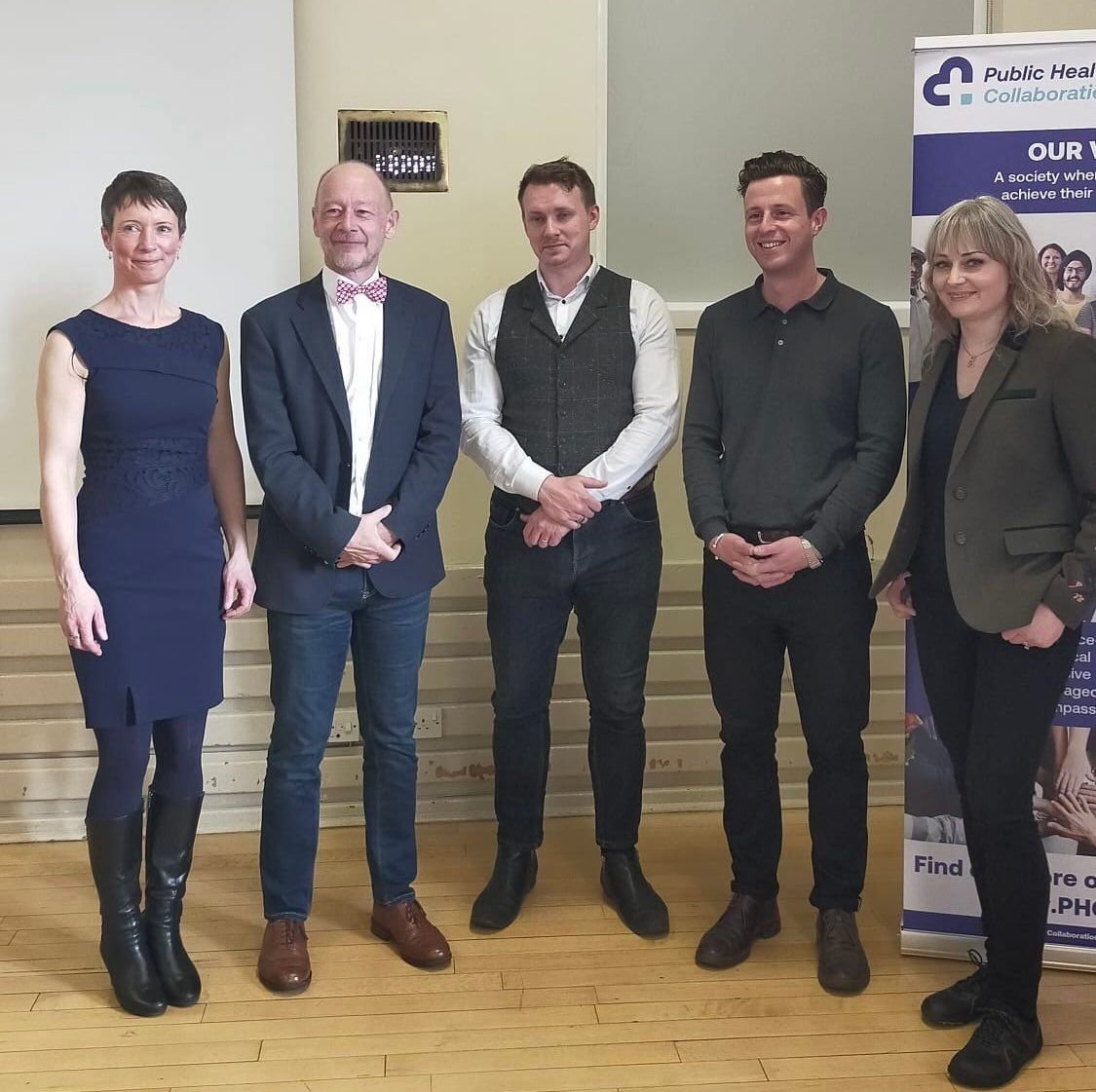[ad_1]

I attended the PHQ conference in Edinburgh on 17 March 23. This was the first such meeting in Scotland and it was well organised, interesting and well attended.
Moira Newiss is on your far left of the photo in her navy dress and black boots. Moira organised the meeting and also spoke about her experience of having post viral fatigue twice in her life. This led her to explore the functioning of the mitochondria in our cells. She found that the mitochondria don’t function normally and become depleted in chronic fatigue syndrome and fibromyalgia but that primitive pathways in the cell using ketones for fuel are still active. She started a ketogenic diet and recovered completely from her chronic fatigue syndrome. She now runs for a hobby.
Dr David Unwin is standing next to her and is wearing a bow tie and suit. He is now 65 years of age and has been promoting low carb diets in his practice for the last ten years with great results. He is having so much fun that he doesn’t want to retire!
He found that in many cases type two diabetics can reverse their condition completely by the adoption of a low carb or ketogenic diet. Statistical analysis showed that the people most likely to reverse their condition had had been diagnosed in the previous 18 months. There is thus a great window of opportunity for advice and coaching to be provided to these patients at the earliest opportunity after diagnosis.
Results after 18 months are more variable, with a great improvement in diabetes seen, but sometimes not to the extent that complete remission occurs. Some medication support is often still necessary. Insulin may be able to be substantially reduced or stopped but some alternative medication may still be required.
Monitoring of patients blood sugars will still be required for both groups lifelong in case high blood sugars return. This can be due to secondary beta cell failure and may require tightening up of the diet, the addition of medication and sometimes insulin. If higher blood sugars and weight loss is reported, pancreatic cancer requires consideration and this is detected by urgent MRI scans. Sometimes a patient has been wrongly diagnosed as type two when they are really type one. In all cases they will need to see their GP for diagnosis.
Dr Iain Campbell is standing next to Dr Unwin and is wearing a waistcoat and white shirt. Iain told us about his struggles with bipolar disorder. There certainly could be a creative advantage to this illness, as Iain spent his young day in a rock band and even now is a successful composer. He has now settled into fatherhood and medicine and since starting a ketogenic diet has been mentally stable. My comment: Dr Christopher Palmer in the USA has also researched this phenomenon and there is a blog article on this site about him. Iain works at the university of Edinburgh, and has done preliminary studies in other patients who have bipolar disorder and has found that anxiety, depression, mood swings and impulsiveness all improve with a ketogenic diet. Further research is planned.
Dr Rachel Bain, on your far right, is a psychiatrist and works with Ally Houston, who is standing beside her, to promote coaching for mental health patients in the low carb diet. The site is metpsy.com.
Rachel explained that the gut and brain are very intimately connected and share the same neurotransmitters. The gut microbiotica are affected by what we eat. This affects our mood. If leaky gut occurs inflammatory substances can gain access to our blood vessels and cross the blood /brain barrier to cause neuro-inflammation. This is one cause of degenerative brain conditions such as Alzheimer’s disease and Parkinson’s disease. The foods most likely to disrupt the junctions between the gut cells are sugar, starch, gluten and alcohol. She and Ally as well as other team members treat people who have Attention Deficit Disorder, Obsessive Compulsive Disorder, Binge Eating Disorder, Bipolar Disorder and Schizophrenia. They don’t aim for a person to stop their medication so much as to gain control of their lives.
Ally Houston used to be a physicist but is now a chef and low carb coach. Comment: Ally also appears in a previous blog post on the site. He explained what coaching was and wasn’t. It isn’t telling someone what to do. It is exploring with the person how their life works now and how they can introduce positive changes around eating sugar, starch, vegetable oils, exercise, stress reduction and sleep.
The services at met.psy.com are out with the NHS and there is a fee for the services, but it is very reasonably priced.
PHQ are expecting videos of the conference to be available on You Tube now or very shortly.
Published by
[ad_2]
Source link

